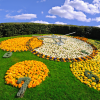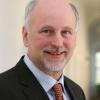
IIASA Interim Deputy Director General for Science, Wolfgang Lutz, has been invited to speak at the Foreign Ministries Science and Technology Advice Network (FMSTAN), as part of the Annual Summit of the Geneva Science and Diplomacy Anticipator.
FMSTAN is a peer network of high-level science advisors within foreign ministries, focusing on the role of science in diplomacy. It is administered by the International Network for Governmental Science Advice (INGSA). Science advisors from over fifteen countries will gather in Geneva, Switzerland to address the challenges that science diplomacy is facing. Together with the “Tech Hub” at the Geneva Graduate Institute and INGSA, FMSTAN has put together a program allowing the sharing of best practices and lessons learned in building and strengthening science and technology advisory capacity in foreign ministries. The meeting will be part of the Annual Summit of the Geneva Science and Diplomacy Anticipator (GESDA), taking place from 12-15 October 2022.
The world currently faces complex circumstances and geopolitical tensions unlike any since the Cold War. One of the themes of the FMSTAN meeting will be to look at the role science diplomacy played in the Cold War and what lessons can be learned – and likewise, how the context has changed and what challenges science diplomacy faces now and in the future.
Lutz will speak during the session “Science Diplomacy and Hostile Geopolitics - the Past as a foundation for the Future” on the creation of IIASA and what it has meant for science diplomacy. He will also reflect on the challenges that international research institutions like IIASA are currently facing. On the panel he will be joined by Mohamed Mahmoud Mohamedou, Deputy Director of the Graduate Institute, Professor of International History and Politics and Director of Executive Education (IHEID), and former Minister of Foreign Affairs and Cooperation of Mauritania; and Rolf Heuer, Designated President of the Council of Synchrotron-Light for Experimental Science and Applications in the Middle East (SESAME).
FMSTAN is founded in 2016 at a meeting convened by the U.S. Science and Technology Advisor to the Secretary of State at the National Academy of Sciences in Washington. The network continues to grow and now numbers members from almost 30 countries, ranging from national chief science advisors to governments to high-level officials leading teams on Science and Technology advice in the ministries.
IIASA was at the score of FMSTAN's creation and has been actively involved in the process from the early stages by, for instance, hosting the International Dialogue on Science Diplomacy, co-organized with the Fletcher School of Law and Diplomacy and INGSA in 2016. In 2019, IIASA, the Austrian Federal Ministry for Europe, Integration and Foreign Affairs, the Vienna School of International Studies (Diplomatische Akademie Wien), and the Natural History Museum Vienna jointly hosted meetings of the FMSTAN and the Science Policy in Diplomacy and External Relations (SPIDER) network in Vienna and Laxenburg. The meeting was attended by over 60 science advisors to ministers of foreign affairs.
Upcoming Events
Potsdam Institute for Climate Impact Research (PIK) & Online
German IIASA Networking Event: "Systems analysis for a sustainable and peaceful future"
Online and Austrian Academy of Sciences (Doktor-Ignaz-Seipel-Platz 2, Vienna)
